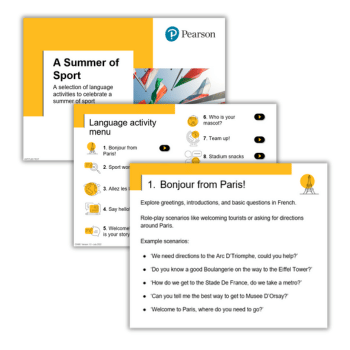Why Your School Should Teach Mandarin – and Why Students Should Learn It

It’s time we started valuing subjects for more than how well they might prepare young people for an unpredictable jobs market, argues Cara Bleiman

- by Cara Bleiman
- Primary Mandarin project consultant within the Harris Federation Visit website

Chinese is one of the few languages bucking the downward trend in terms of numbers of pupils taking the subject at GCSE.
In fact, the profile of Mandarin has grown immensely over the past ten years; no longer the privilege of elite public schools, the language is now in fierce competition with French and Spanish for MFL curriculum time, pupils and staffing budgets in many comprehensives.
Mandarin’s ascent is partly down to outside funding – including from the Chinese government, which subsidises the costs of native language assistants in many classrooms – but also due to the attitude that Chinese is somehow more relevant, current and useful for pupils than those old stalwarts, French and German.
Hanban (the Chinese equivalent of the British Council) recently noted a survey of 1,000 British parents, in which over half said they thought learning Chinese would contribute to the future development of their children’s careers.
David Cameron kick-started the shift towards Mandarin by saying: “When students enter into society, China will be the largest economy in the world. Hence it is time for us to shift our focus from French and German to Chinese, having more children learn it.”
Meanwhile, a popular language learning website describes Mandarin as one of “the absolute best investments you can make”.
The reasons given for learning Chinese all seem to focus on the booming Chinese economy (particularly in the light of shifting trade relationships post-Brexit), an opening up to foreign investment, and the need to give pupils relevant skills for the future jobs market.
With this attitude, Chinese is in danger of becoming the latest in a string of “firework’” languages to burst into our schools with an exciting show of drama and colour before quickly fizzling out.
Both Japanese and Russian made sparks in the 80s and 90s before their economies were overshadowed by China.
Whilst injections of funding to promote Mandarin are exceptionally welcome, we need to ensure that Chinese is not just a passing trend – and to do this we need to defend the value of learning languages for their own sake.
Past wisdom
At the same time as the number of pupils learning Chinese is on the rise, Latin too has experienced a revival in state schools – but for the opposite reason. Latin and Classics are being argued for because they give us insight into our past, rather than provide adequately skilled workers for an uncertain economic future.
Arguments for “dead” languages have long been made by Tory cabinet ministers nostalgic for their days at public school, with Boris Johnson, for example, arguing that Latin and Greek are “key to a phenomenal and unsurpassed treasury of literature, history and philosophy, and we cannot possibly understand our modern world unless we understand the ancient world that made us all.”
Now, organisations like ‘Classics for All’ and ‘The Latin Programme’ are championing these arguments more widely.
They make the case that ancient languages, whilst seemingly “useless” in comparison to the likes of Chinese, are nevertheless key to our understanding of philosophy, history and literature, and give pupils a whole cultural reference framework from which they can better understand art, politics and their place in our modern world.
But these arguments apply to Chinese too – and if we don’t use them as a compelling reason for learning Mandarin, it’s unlikely to become a sustainable feature of the educational landscape.
So, in brief: let’s teach and learn Chinese because of our shared past, not just because of a potentially fragile prediction about the needs of the future economy.
A shared inheritance
When I refer to a “shared past”, don’t fret; I’m not talking about the Opium Wars or the Cold War. I mean simply that the great achievements of China’s past are not just the birthright of those who happened to be born in China.
With an increasingly connected world, who’s to say that the ideas of a toga-wearing Greek are any more or less relevant to our students than those of a Tang dynasty poet?
Whether Hadrian’s Wall or the Great Wall, the accomplishments of past civilisations are humanity’s shared inheritance and should be celebrated for their own sake.
Matthew Arnold’s old adage that we should teach “the best that’s been thought and said” rings true today, with languages as the best way to open up the world of great ideas that didn’t happen to be thought in English.
There’s no doubt that learning a language is an investment in the future – but not in the crude sense of increasing a learner’s ultimate earning potential. In thinking that way, we have things upside down; we are in danger of tethering our current educational values to the economic needs of an unpredictable future.
In fact, the future will be advanced by visionaries who can see further only by standing on the shoulders of the giants of civilisations past.
Furthermore, the problems of the future will be solved only by those who have learned from the problems of the past. It’s now time to see that the great ideas – and indeed, the great mistakes – of the past are to be found in the cultures of both the East and the West.
If we root our educational values in the task of passing on the best ideas of the past, the next generation will truly have the tools to shape a better future.
Join the Conversation!
The Academy of Ideas Education Forum gathers monthly to discuss trends in educational policy, theory and practice. To find out about the next event, visit academyofideas.org.uk/forums/education_forum.
Cara Bleiman has worked in inner-city London primary schools for the past 6 years as a class teacher, English subject leader and MFL coordinator. She now works as Mandarin primary specialist teacher for the Harris Federation.










